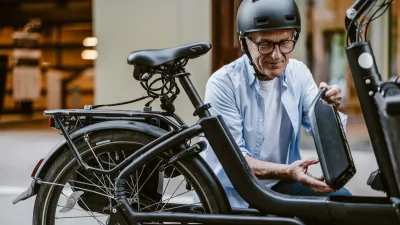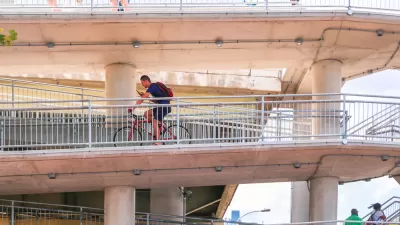Tanya Snyder examines the various ways in which bicyclists bring increased business and added value to their local communities.
Despite common misconceptions that make officials and business owners resistant to adding bike infrastructure, bicycle advocates are making headway in arguing that bikes bring an economic boost to cities.
According to Snyder, "Far and away, the biggest reason business owners resist the addition of bike infrastructure is that they're afraid it will limit parking. Once they realize they can get 12 bike parking spaces for each car spot, sometimes they begin to change their tune. Even better, they begin to discover that cyclists can be their best customers. 'We tend to shop closer to home and shop more often,' said April Economides, a consultant who helped the city of Long Beach, California build bicycle-friendly business districts."
In St. Louis, Washington University quantified the economic benefit of Open Streets events, and found that "73 percent of Open Streets participants spent money at a restaurant or store on the route, and 68 percent became aware of a restaurant or store that was new to them."
The economic benefits of bike infrastructure development don't stop there, notes Snyder: trails bring tourists and bike paths increase property values.
"Add to that the fact that bike lane construction creates about twice as many jobs as road-building for the same amount of money, and you've got yourself a great economic argument to take to local leaders and politicians when you ask them to support walking and biking – even (or especially) in tough economic times." says Snyder.
FULL STORY: Why Bicyclists Are Better Customers Than Drivers for Local Business

Planetizen Federal Action Tracker
A weekly monitor of how Trump’s orders and actions are impacting planners and planning in America.

Restaurant Patios Were a Pandemic Win — Why Were They so Hard to Keep?
Social distancing requirements and changes in travel patterns prompted cities to pilot new uses for street and sidewalk space. Then it got complicated.

Map: Where Senate Republicans Want to Sell Your Public Lands
For public land advocates, the Senate Republicans’ proposal to sell millions of acres of public land in the West is “the biggest fight of their careers.”

Maui's Vacation Rental Debate Turns Ugly
Verbal attacks, misinformation campaigns and fistfights plague a high-stakes debate to convert thousands of vacation rentals into long-term housing.

San Francisco Suspends Traffic Calming Amidst Record Deaths
Citing “a challenging fiscal landscape,” the city will cease the program on the heels of 42 traffic deaths, including 24 pedestrians.

California Homeless Arrests, Citations Spike After Ruling
An investigation reveals that anti-homeless actions increased up to 500% after Grants Pass v. Johnson — even in cities claiming no policy change.
Urban Design for Planners 1: Software Tools
This six-course series explores essential urban design concepts using open source software and equips planners with the tools they need to participate fully in the urban design process.
Planning for Universal Design
Learn the tools for implementing Universal Design in planning regulations.
Heyer Gruel & Associates PA
JM Goldson LLC
Custer County Colorado
City of Camden Redevelopment Agency
City of Astoria
Transportation Research & Education Center (TREC) at Portland State University
Camden Redevelopment Agency
City of Claremont
Municipality of Princeton (NJ)





























